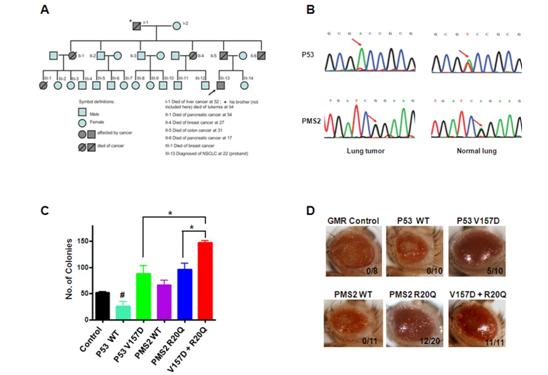Familial cancer usually happens in the early stage of one's life, presumably dues to the constitutive and continuous action of the cancer-predisposition genetic alterations.
Recently, researchers led by JI Hongbin and ZHAO Yun, at the Institute of Biochemistry and Cell Biology (SIBCB), Shanghai Institutes for Biological Sciences identified a familial syndrome with the germline mutations of tumor suppressor gene P53V157D and mismatch repair gene PMS2R20Q. Both mutants are capable of promoting tumor formation from in vitro study as well as in vivo model system study under the DNA-damaging condition.
Germline mutations are responsible for familial cancer syndromes which account for approximately 5~10% of all types of cancers. These mutations mainly occur at tumor suppressor genes or genome stability genes, such as DNA repair genes.
By the sequencing analysis of tumor samples as well as histologically normal specimens, researchers identified two germline mutations co-existing in the familial cancer syndrome, the mutation of tumor suppressor gene P53 V157D and mismatch repair gene PMS2 R20Q. The in vitro study demonstrated that P53 V157D and/or PMS2 R20Q mutant could promote the lung cancer cell proliferation. These two mutants were capable of promoting colony formation in soft agar as well as tumor formation in transgenic drosophila system.
These results may provide a novel insight into the cancer development mechanism via the potential functional interaction between the loss-of-function mutants of a tumor suppressor and a DNA mismatch repair gene.
This work entitled “Two co-existing germline mutations P53 V157D and PMS2 R20Q promote tumorigenesis in a familial cancer syndrome”, cooperated with Dr. CHEN Haiquan, at Shanghai Cancer Hospital, Fudan University was published online in Cancer Letters on Aug 24th, 2013. It was supported by the National Basic Research Program of China (2012CB910800 and 2010CB912102), and the National Natural Science Foundation of China (30971461).
CONTACT:
JI Hongbin
Institute of Biochemistry and Cell Biology, Shanghai Institutes for Biological Sciences, Chinese Academy of Sciences
Shanghai, China
Phone: 86-21-54921108; E-mail: hbji@sibcb.ac.cn

A) Identification of a cancer predisposition family. B) Coexistence of P53 V157D and PMS2 R20Q germline mutations in the proband. C) P53 V157D and/or PMS2 R20Q mutants promote tumorigenesis in vitro. D) P53 V157D and/or PMS2 R20Q mutants promote tumorigenesis in transgenic flies after UV irradiation. (Image by Dr. JI Hongbin’s group)

